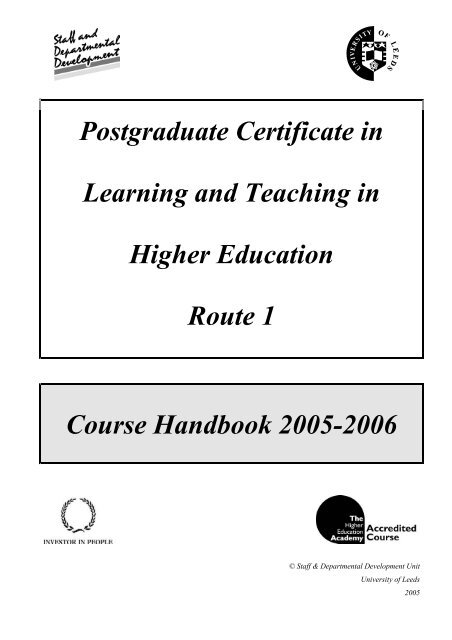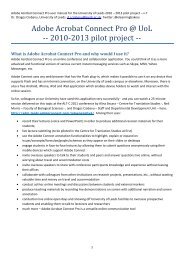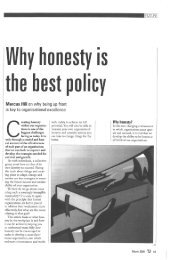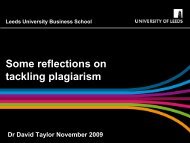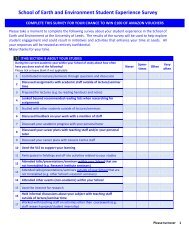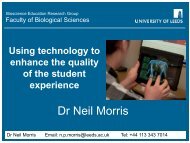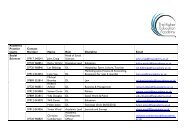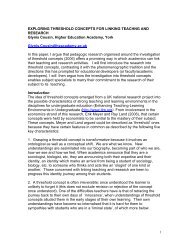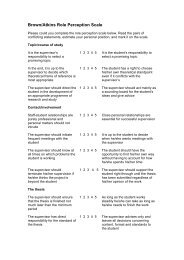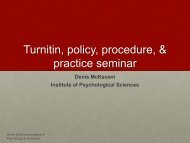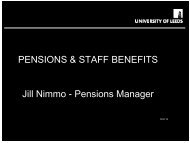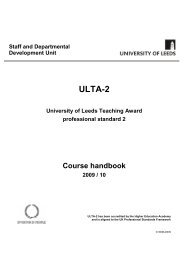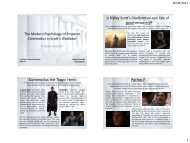PGCert Handbook - Staff and Departmental Development Unit
PGCert Handbook - Staff and Departmental Development Unit
PGCert Handbook - Staff and Departmental Development Unit
Create successful ePaper yourself
Turn your PDF publications into a flip-book with our unique Google optimized e-Paper software.
Postgraduate Certificate in Learning <strong>and</strong> Teaching in Higher Education <strong>H<strong>and</strong>book</strong> Route 1: 2005-2006curriculum <strong>and</strong> in the institution. The programme will encourage participants to consider issues of cultural <strong>and</strong> educationaldiversity as appropriate to their teaching contexts.Be colleague centredYou <strong>and</strong> other participants in the programme are not undergraduates but colleagues with your own professional expertise todevelop. It is therefore important that the tutors involved are sensitive to the needs <strong>and</strong> status of the group.The programme will demonstrate the value of working with, <strong>and</strong> learning from, colleagues. Through its delivery methods,the course will enable participants to benefit from co-operation <strong>and</strong> sharing, <strong>and</strong> encourage a more open <strong>and</strong> collaborativeapproach to teaching. (More details in Section 9: What support will you get ? on page 11.)In addition, every participant will be assigned to a departmental mentor for teaching who will have joint responsibility withyou for your professional development on the programme. The section on mentoring in this h<strong>and</strong>book will form part of thebriefing for all mentors. (More details of mentoring are provided in section 9: What support will you get ? on page 11.)Develop reflective practitionersIt is not proposed to rehearse all the arguments from Kolb (1984) 1 , Schon (1988) 2 , Moon (1999) 3 <strong>and</strong> earlier writers on thevalue of reflective learning. The primary purpose of the programme is to lay the foundations of continuing professionaldevelopment so that as a lecturer you are equipped to analyse <strong>and</strong> respond to changes in teaching, learning <strong>and</strong> assessmentthroughout your career. Hence, the programme will encourage you to reflect on your approaches to these responsibilitiesthrough the assignments <strong>and</strong> professional development plans, the compilation of a portfolio <strong>and</strong> discussions with yourmentor <strong>and</strong> other participants. Through this process it is anticipated that you will both develop your expertise <strong>and</strong> deepenyour underst<strong>and</strong>ing of teaching, learning <strong>and</strong> assessment.As a ‘reflective practitioner’ you will:• review your own performance <strong>and</strong> take account of peer <strong>and</strong> student feedback• select teaching methods that allow for student learning styles, preferences <strong>and</strong> previous experience• refer to the literature on learning <strong>and</strong> teaching as well as taking account of your own experience• constantly seek means to enhance both the learning experiences of your students <strong>and</strong> your own experience as alecturer.3 What will the programme do for you ?The Certificate is perceived as the first of three, inter-related stages of a programme of continuing professionaldevelopment (CPD) in learning <strong>and</strong> teaching for academic staff. Stage two - the Postgraduate Diploma in Learning &Teaching in Higher Education (PGDLTHE) - provides an opportunity for more experienced practitioners to enhance <strong>and</strong>further develop the quality of the learning experiences offered to students. It is anticipated that participation in this coursewill constitute appropriate CPD activity to demonstrate ‘remaining in good st<strong>and</strong>ing’ for retaining ILTHE membership.Stage three will lead to the award of an MA. This component is one of a portfolio of MA options offered by the School ofEducation. C<strong>and</strong>idates who successfully complete the Postgraduate Certificate or the Postgraduate Diploma will be eligiblefor advanced st<strong>and</strong>ing towards the general MA course: 60 credits for the Certificate <strong>and</strong> 120 credits for the Diploma.The overall aim of the Certificate programme is to develop an independent, competent professional who has knowledge <strong>and</strong>expertise in the areas of higher education teaching <strong>and</strong> its management in the wider context of a changing studentpopulation. The programme focuses initially upon the practical tasks of newly appointed lecturers. Its aims are therefore:• to provide participants with an opportunity to critically reflect upon, assess <strong>and</strong> develop their professional expertiseas university teachers• to develop the knowledge, skills, competencies <strong>and</strong> underst<strong>and</strong>ing necessary for effective teaching <strong>and</strong> managementof student learning at university level <strong>and</strong> which take account of the needs <strong>and</strong> backgrounds of students <strong>and</strong> theprovision of equal opportunities• to establish a network of support amongst participants that will enable them to carry out their teaching duties with agreater degree of confidence, underst<strong>and</strong>ing <strong>and</strong> satisfaction1Kolb, D. Experiential Learning: experience as a source of learning. Englewood Cliffs: Prentice Hall, 1984.2Schon, D.A. Educating the Reflective Practitioner. San Francisco: Jossey Bass, 1988.3Moon, J. Reflection in Learning & Personal <strong>Development</strong>. London: Kogan Page, 1999.<strong>Staff</strong> <strong>and</strong> <strong>Departmental</strong> <strong>Development</strong> <strong>Unit</strong> Page 2 University of Leeds
Postgraduate Certificate in Learning <strong>and</strong> Teaching in Higher Education <strong>H<strong>and</strong>book</strong> Route 1: 2005-2006• to provide a pathway to registration with the Higher Education Academy• to contribute to the improvement of the status of teaching <strong>and</strong> the quality of student learning at the University• to demonstrate the commitment of the University to the value of professional development in teaching.The programme will provide you with opportunities to explore a variety of approaches to teaching, learning <strong>and</strong> assessmentwith particular reference to current developments <strong>and</strong> issues in higher education, <strong>and</strong> to experience a range ofteaching/learning methods (including on-line <strong>and</strong> paper-based open learning <strong>and</strong> various formats of face-to-face teaching).As a result, by the end of the Certificate programme, you will be better able to:• demonstrate competence <strong>and</strong> skill in underst<strong>and</strong>ing <strong>and</strong> using a wide range of methods of teaching, learning <strong>and</strong>assessment• plan, implement <strong>and</strong> evaluate your own teaching strategies, based upon both best practice <strong>and</strong> research into learning<strong>and</strong> teaching• underst<strong>and</strong> how students learn• identify student learning needs <strong>and</strong> take account of those needs in your course design <strong>and</strong> in the teaching methods<strong>and</strong> learning opportunities provided to students• design courses as coherent teaching/learning programmes incorporating congruous assessment procedures• develop methods of evaluating teaching <strong>and</strong> courses• reflect critically upon your own teaching practice, identify developmental needs <strong>and</strong> formulate plans for appropriatecontinuing professional development• enhance your knowledge <strong>and</strong> underst<strong>and</strong>ing of higher education through awareness of <strong>and</strong> ability to evaluaterelevant educational literature (both generic <strong>and</strong> subject-specific).The Postgraduate Certificate in Learning <strong>and</strong> Teaching in Higher Education is approved <strong>and</strong> quality assured by theUniversity’s Learning <strong>and</strong> Teaching Board (LTB) as a 60-credit, level M award. The course will provide you with avaluable, portable <strong>and</strong> recognised qualification. The programme is accredited by the Higher Education Academy (HEA).4 What's in the programme ?Route 1 to the Postgraduate Certificate in Learning & Teaching in Higher Education comprises four, 15-credit modules.You have to complete all 4:• SDDU5110 Essentials of Teaching• SDDU5120/5125 Essentials of Learning <strong>and</strong> Assessment• SDDU5140 Managing <strong>and</strong> Evaluating Teaching• SDDU5160 Teaching with Learning TechnologySDDU5110 is held in September, SDDU5120/5125 commences in October, SDDU5140 is held in January <strong>and</strong> SDDU5160starts just after the beginning of the second term in February.Each module comprises:• on average, the equivalent of 15 - 20 hours of workshops• discussions with your mentor (~ 5 hours)• preparation for <strong>and</strong> completion of the assignment (~ 40 hours)• reading/independent study (~ 45 hours)• practice (teaching <strong>and</strong> managing student learning) <strong>and</strong> use of different methods of reflecting on practice in order tocomplete one of the professional development plans (~ 40 hours)A detailed description of each module is given in the separate module h<strong>and</strong>books. The details provided include:• the aims <strong>and</strong> outcomes• the content• methods of learning <strong>and</strong> teaching• assessment - the assignment specification <strong>and</strong> the outline marking criteria.<strong>Staff</strong> <strong>and</strong> <strong>Departmental</strong> <strong>Development</strong> <strong>Unit</strong> Page 3 University of Leeds
Postgraduate Certificate in Learning <strong>and</strong> Teaching in Higher Education <strong>H<strong>and</strong>book</strong> Route 1: 2005-20065 Your commitments to the CertificateThe Certificate programme for 2005 - 2006 is given in Section 6 (see page 5).• SDDU5110 comprises three full days in September, reference to on-line resources <strong>and</strong> directed reading• SDDU5120 comprises eight Wednesday afternoons in October <strong>and</strong> November or web-based open learning materialssupported by completion of tutor-led, online tasks• SDDU5140 comprises three full days in early January. It also includes attendance at the University of Leeds Learning& Teaching Conference on 5 January 2006• SDDU5160 comprises eight Wednesday afternoons in February <strong>and</strong> March• each module has a related assignment based on your work with students• you will need to meet your mentor at least three times for each assignment• your mentor will observe you teaching twice as part of assignment one• you are expected to attend all of the Certificate sessions for which you are registered• all four modules include reference to online resources, to access these you must have a Nathan Bodington username• you are expected to read <strong>and</strong> engage with the materials set for the focused reading weeks <strong>and</strong> complete the directedtasks• you are expected to complete the three professional development plans.http://www.leeds.ac.uk/sddu/pgcert/pdp.htmAccepted Ways to Gain CertificationThe maximum period that you have to finish the Certificate is four years, but we strongly recommend that you complete inless. There are three components of the PGCLTHE: attendance for four modules, four assignments, <strong>and</strong> three professionaldevelopment plans. Normally, you are expected, as a minimum, to submit:iiiprofessional development plan 1 immediately after your first modulean assignment plan 4 , including a brief literature survey, (signed off by the mentor) for an assignment by the end ofApril of the first academic year that you are registered on the programmeiii one assignment <strong>and</strong> professional development plan 2 by 1 September following your registrationivvvia second assignment during year 2 of your registrationprofessional development plan 3 with your final assignmentall assignments within 4 years.4The assignment plan should give an overview of your planned case study. It should comprise between 250 <strong>and</strong> 500 words <strong>and</strong> includefive indicative items from your bibliography. It should be discussed with <strong>and</strong> signed by your mentor. You should submit eitheran email or paper copy to Jo Siddons who will receipt arrival. You will receive brief feedback from a member of the course team.<strong>Staff</strong> <strong>and</strong> <strong>Departmental</strong> <strong>Development</strong> <strong>Unit</strong> Page 4 University of Leeds
Postgraduate Certificate in Learning <strong>and</strong> Teaching in Higher Education <strong>H<strong>and</strong>book</strong> Route 1: 2005-20066 Certificate programmeSDDU5110: Essentials of TeachingThis module is run twice - 6, 7 & 9 September 2005 <strong>and</strong> 13, 14 <strong>and</strong> 16 September 2005 - <strong>and</strong> you may choose which cycle toattend.Tuesday, 6 September 2005 or Tuesday, 13 September 2005 (9.30 am – 5.00 pm)Introduction to the Certificate; lecturing <strong>and</strong> explaining & video 1 [1-1] & [1-2]Following an overview of the Certificate programme, you will work in small groups to give short presentations (‘minilectures’)which will be video-recorded. The recordings will be reviewed with a tutor <strong>and</strong> course colleagues. A number ofaspects of lecture planning, structuring <strong>and</strong> presenting will be discussed.Wednesday, 7 September 2005 or Wednesday, 14 September 2005 (9.30 am – 5.00 pm)Small group teaching [1-3] & academic <strong>and</strong> pastoral tutoring [1-4]Learning in small groups is an important component of the student experience at Leeds. As well as being a means ofcovering subject content, small-group work is a useful training medium for helping students to develop collaborative,communication <strong>and</strong> interpersonal skills. The session will focus on student behaviours in group contexts, <strong>and</strong> how we canrespond to ‘difficult’ situations. We will also look at a range of factors relating to group size <strong>and</strong> composition, <strong>and</strong> howbest to ensure that students participate fully in group work contexts. The afternoon session will be concerned with theUniversity’s guidelines on academic & pastoral tutoring. Case studies will be used to raise issues <strong>and</strong> ideas about theways in which we might deal with students’ problems. The Student Support Network, including the Student CounsellingService, will be described.Friday, 9 September 2005 or Friday, 16 September 2005 (9.30 am – 5.00 pm)PGCLTHE assignment: reflecting <strong>and</strong> evaluating on teaching & using the virtual learning environment atLeeds (NBB)The morning session outlines the assessment requirements of the PGCLTHE <strong>and</strong> provides a guide to writing the moduleassignments by looking at methods of reviewing teaching. The session will provide a mechanism by which you can improveyour own teaching practice <strong>and</strong> will help you to work out ways of gathering feedback about your teaching as it develops.We will also discuss how best you may go about the task of evidencing your on-going reflection during your continuingprofessional development. In the afternoon you will have a chance to audit your own IT skills <strong>and</strong> make plans for anytraining that you need. You will be introduced to the web-based materials that you will be using during the course <strong>and</strong> willhave time to explore the University’s virtual learning environment (VLE)Monday / Tuesday 19/20 September 2005Meeting the Pro-Deans for Learning & Teaching in your facultyMeetings will be arranged, on a faculty basis, for you to meet your faculty Pro-Dean for Learning & Teaching. Theseusually last between 60-90 minutes <strong>and</strong> are designed to give you an insight into the QA & QE arrangements within thefaculty <strong>and</strong> the University more widely.Wednesday, 21 September 2005Directed task & focused reading week #1A task / readings related to large <strong>and</strong> small group teaching <strong>and</strong> individual tutoring.**********************************Term starts Wednesday 21 September 2005Teaching starts: Monday, 26 September 2005**********************************Deadline: Initial Professional <strong>Development</strong> Plan - end of the module<strong>Staff</strong> <strong>and</strong> <strong>Departmental</strong> <strong>Development</strong> <strong>Unit</strong> Page 5 University of Leeds
Postgraduate Certificate in Learning <strong>and</strong> Teaching in Higher Education <strong>H<strong>and</strong>book</strong> Route 1: 2005-2006Wednesday afternoon sessions will normally be held twice (from 1.00 - 3.15 <strong>and</strong> from 3.45 - 6.00) <strong>and</strong> participants may choosewhich session to attend. This module can be completed either by attending the sessions or by web-based open learning materialssupported by completion of tutor-led, online tasks. The open learning pathway will be introduced during a session on28 September <strong>and</strong> all work <strong>and</strong> postings must be completed by Thursday 22 December 2005.(NB You cannot mix modes – you must select either the Wednesday afternoon sessions or the open learning route.)SDDU5120: Essentials of Learning <strong>and</strong> AssessmentWednesday, 28 September 2005 (1.00- 2.00)SDDU5125 - open learning: briefingWednesday, 5 October 2005 (1.00 – 3.15 or 3.45 – 6.00)Underst<strong>and</strong>ing student learning [2-1]How do students learn? How do students approach learning? What affects the ways in which students learn? Answeringthese questions will allow you to review whether your teaching style matches the varying learning styles <strong>and</strong> preferences ofyour students.Wednesday, 12 October 2005 (1.00 – 3.15 or 3.45 – 6.00)Assessment – types <strong>and</strong> methods [2-2]Why assess? Assess what <strong>and</strong> when? How can we assess in a valid <strong>and</strong> reliable way? These questions will lead us tocompare a range of techniques <strong>and</strong> link them to purposes.Wednesday, 19 October 2005 (1.00 – 3.15 or 3.45 – 6.00)Assessment – marking <strong>and</strong> giving feedback [2-3]What criteria do you apply when awarding a pass/first class/fail grade for an assignment? How do the students know thest<strong>and</strong>ards <strong>and</strong> expectations? How can we give feedback in an effective <strong>and</strong> efficient manner? A number of options will bereviewed.Wednesday, 26 October 2005Widening Participation <strong>and</strong> the changing student population – open learningThis session requires you to work through, in your own time, an on-line diversity training package commissioned by the University’sEquality <strong>Unit</strong> <strong>and</strong> which provides information <strong>and</strong> guidance about diversity legislation <strong>and</strong> equal opportunities in the workplacethat will form the basis of our discussions about the diversity of our students.Wednesday 2 November 2005 (1.00 – 3.15 or 3.45 – 6.00)Widening Participation <strong>and</strong> the changing student population – discussion [2-4]This session provides a follow up to the on-line learning by exploring how we can best support the learning of a diversestudent body <strong>and</strong> ensure that we provide equal opportunities for all students to succeed. The session will examine how wecan make teaching <strong>and</strong> assessment processes as inclusive as we can.Wednesday 9 November 2005 (1.00 – 3.15 or 3.45 – 6.00)Assessment: recording <strong>and</strong> reviewing [2-5]This session will consider ways of involving students in the assessment process through implementing self <strong>and</strong> peerassessment. In addition, traditional assessment methods only measure <strong>and</strong> report a limited range of student achievements<strong>and</strong> competencies <strong>and</strong> the session will examine how we might evaluate <strong>and</strong> record the outcomes of a wider range of studentlearning experiences.Wednesday, 16 November 2005 (1.00 – 3.15 or 3.45 – 6.00)Integrating technology into teaching [2-6]An introduction to the range of technology tools available to support learning <strong>and</strong> teaching <strong>and</strong> strategies for their use.This session will explore strategies for good practice in finding, evaluating <strong>and</strong> using web based materials.Wednesday, 23 November 2005 (1.00 – 3.15 or 3.45 – 6.00)Introduction to e-learning [2-7]This session will offer you the opportunity to get h<strong>and</strong>s-on with some e-learning materials <strong>and</strong> evaluate theappropriateness of the pedagogical strategies behind them.Wednesday, 30 November 2005Directed task & focused reading week #2A task / readings related to student learning, equal opportunities, assessment <strong>and</strong> e-learning.Mentors’ meetings: a series of dates will be arranged in November & December**********************************Teaching ends: Friday, 9 December 2005**********************************<strong>Staff</strong> <strong>and</strong> <strong>Departmental</strong> <strong>Development</strong> <strong>Unit</strong> Page 6 University of Leeds
Postgraduate Certificate in Learning <strong>and</strong> Teaching in Higher Education <strong>H<strong>and</strong>book</strong> Route 1: 2005-2006SDDU5140: Managing <strong>and</strong> Evaluating Teaching (including L&T conference & options)Thursday 5 January - Tuesday 12 January 2006 inclusiveThursday, 5 January 2006 (all day)Options [3-1]A number of options (e.g. Laboratory & project work, Student skills, M-level, Problem based learning) will be arranged <strong>and</strong>you will be expected to select at least one. Attendance at an LTSN event or a relevant session from the SDDU openprogramme (e.g. Effective research student supervision) is an acceptable alternative.Friday, 6 January 2006 (9.30 – 4.30)University of Leeds’ Learning & Teaching Conference [3-2]http://www.ldu.leeds.ac.uk/news/events/conference.htmDesigning <strong>and</strong> Reviewing Modules <strong>and</strong> ProgrammesThe various components of a course design model will be considered in detail: rationale for a course - fitness for purpose& fitness of purpose; descriptors of outcomes; setting aims & objectives; intellectual dem<strong>and</strong> <strong>and</strong> generic skills; selectionof content; objectives - content & skills matrices; teaching <strong>and</strong> learning methods; setting st<strong>and</strong>ards <strong>and</strong> criteria; matchingassessment to objectives; managing courses; getting the ‘climate’ <strong>and</strong> ‘environment’ right; evaluating <strong>and</strong> reviewingteaching & courses; the module & programme review process at Leeds. Also, the final session will look at who (externally& internally) is responsible for setting, monitoring, measuring <strong>and</strong> maintaining st<strong>and</strong>ards.Monday 9 January 2006 (9.30 – 4.30)Course design Day 1 [3-3] & [3-4]Tuesday 10 January 2006 (9.30 – 4.30)Course design Day 2 [3-5] & [3-6]****************************Wednesday, 18 January 2006Directed task & focused reading week #3A task / readings related to course design.***************************************Semester 1 Assessment period 9 – 20 January 2006Teaching starts: Monday, 23 January 2006***************************************<strong>Staff</strong> <strong>and</strong> <strong>Departmental</strong> <strong>Development</strong> <strong>Unit</strong> Page 7 University of Leeds
Postgraduate Certificate in Learning <strong>and</strong> Teaching in Higher Education <strong>H<strong>and</strong>book</strong> Route 1: 2005-2006Wednesday afternoon sessions will normally be held twice (from 1.00 - 3.15 <strong>and</strong> from 3.45 - 6.00) <strong>and</strong> you may choose whichsession to attend.*************************************Teaching starts on 23 January & finishes on 5 May 2006*************************************SDDU5160: Teaching with Learning TechnologyWednesday, 25 January 2006 (1.00 – 3.15 or 3.45 – 6.00)Teaching in a virtual learning environment [4-1]A shift in practice away from traditional teaching methods towards the integration of technology <strong>and</strong> the use of virtuallearning environments brings new areas of concern around traditional issues. This session will touch on issues ofdisability, inclusivity, learning styles, quality assurance, ethics, monitoring, intellectual property, copyright <strong>and</strong> plagiarismon the web.Wednesday, 1 February 2006 (1.00 – 3.15 or 3.45 – 6.00)Integrating technology into assessment [4-2]Why assess? Assess what <strong>and</strong> when? How can we assess in a valid <strong>and</strong> reliable way? A range of computer based toolshave been developed to assist with the assessment process but each has its benefits <strong>and</strong> challenges <strong>and</strong> the use of computeraidedassessment is still contentious. Should these tools be used for formative or summative assessment? Are they useful atall levels of study? How can we decide which, <strong>and</strong> when, tools are appropriate?Wednesday, 8 February 2006 (1.00 – 3.15 or 3.45 – 6.00)Using audio, video <strong>and</strong> other multimedia in teaching [4-3]New technologies allow us to integrate a range of multimedia into our teaching. How does this affect student learning?How interactive do you need multimedia to be? How will this integrate into the other teaching on your course? How canyou address confusion between the medium <strong>and</strong> the message?Wednesday, 15 February 2006Directed task & focused reading week #4A task / readings related to teaching with learning technology.Wednesday, 22 February 2006 (1.00 – 3.15 or 3.45 – 6.00)Planning online courses [4-4]What is an online course? What models of online delivery exist? Are there new roles <strong>and</strong> skills required for onlineteaching? How can a teacher help online, distant students to learn? How can we assure quality in the development ofonline programmes?Wednesday, 1 March 2006 (1.00 – 3.15 or 3.45 – 6.00)Using technology to support students [4-5]The growing range of new communication tools (e.g. discussion rooms, email, chat, mobile phones, PDAs) offers excitingchallenges to lecturers supporting <strong>and</strong> facilitating student learning. Why do so many online discussion groups for studentslie empty? How do students with different learning styles respond to the integration of technology? How can these tools beused in effective teaching <strong>and</strong> support?Wednesday, 8 March 2006 (1.00 – 3.15 or 3.45 – 6.00)Evaluating technology in teaching [4-6]When we attempt to evaluate the use of technology in teaching do we evaluate the technology, the course design or theteaching? Why do so many evaluation reports find ‘no significant difference?’ Are we asking the right questions?Wednesday, 15 March 2006C & IT <strong>and</strong> assignment clinics [4-7]An opportunity to discuss C & IT issues or problems <strong>and</strong> / or discuss plans for any of your PGCLTHE assignments.If planning to complete this year – one assignment must be submitted by the end of April 2006.If planning to take more than one year to complete the course you must: a) submit an assignment plan(including a brief literature survey (signed off by your mentor) for an assignment by the end of April 2006;b) submit one assignment <strong>and</strong> the interim professional development plan by 1 September 2006Last date for h<strong>and</strong>ing in work is 1 September each year.<strong>Staff</strong> <strong>and</strong> <strong>Departmental</strong> <strong>Development</strong> <strong>Unit</strong> Page 8 University of Leeds
Postgraduate Certificate in Learning <strong>and</strong> Teaching in Higher Education <strong>H<strong>and</strong>book</strong> Route 1: 2005-20067 How will the programme be taught ?The delivery of the programme recognises the need to:• be practical• be relevant• demonstrate active learning methods• model a variety of approaches to teaching <strong>and</strong> learning• integrate theory <strong>and</strong> practice, <strong>and</strong> provide opportunities for participants to analyse <strong>and</strong> reflect upon applicability totheir own context• generate an environment that fosters <strong>and</strong> promotes group identity <strong>and</strong> peer support.To achieve these a wide variety of teaching <strong>and</strong> learning methods will be used in the programme including lectures, smallgroup sessions, video analyses, simulations, case studies, experiential learning, paper-based <strong>and</strong> on-line open learningmaterials <strong>and</strong> resource based learning. As a result you will need access to a networked computer for the whole of theprogramme <strong>and</strong> a Nathan Bodington username.Colleagues from a number of departments in the University will be involved in facilitating some of the sessions.You will be encouraged to experiment with these methods, where appropriate, when teaching your own modules <strong>and</strong>programmes of study. You will also be encouraged to identify examples of good practice in your own discipline area <strong>and</strong>to share these in order to demonstrate the benefits <strong>and</strong> potential of peer <strong>and</strong> cross-disciplinary cooperation.The Nathan Bodington Building http://vle.leeds.ac.uk/site/nbodington/sddu/pgclthe/ <strong>and</strong> the PGCLTHE web sitehttp://www.leeds.ac.uk/sddu/pgcert/ will be used to provide support <strong>and</strong> for administrative purposes.You will be directed to specific reading <strong>and</strong> references for the focused reading weeks on the topics listed in the schedule<strong>and</strong> you will be set tasks to complete for the follow-on discussions. In addition you will be expected to consult disciplinespecific literature <strong>and</strong> will be given guidance on locating this.8 How will you be assessed ?For each of the modules, one assignment will be set which will arise directly out of the content of the module <strong>and</strong> itsapplications to your work.All assignments comprise a written case study report with an option for an alternative oral presentation for EITHERmodule 2 or module 4. All assignments are based on the same assessment criteria, i.e. for both the written case study report<strong>and</strong> oral presentation - see the separate module h<strong>and</strong>books.Participants who select the oral presentation option for either of these assignments must notify Jo Siddons by the start ofJuly in the year in which they wish to present. Presentations will be held during the 2 nd <strong>and</strong>/or 3 rd week of September.The assignments will contribute equally to the award of the Certificate, <strong>and</strong> will be assessed by members of the programmeteam. For assignment one, however, a component of the grade will be decided jointly by you <strong>and</strong> your mentor. Writtenfeedback will be given on all assignments. You will also be required to complete <strong>and</strong> h<strong>and</strong> in the three professionaldevelopment plans to be found at http://www.leeds.ac.uk/sddu/pgcert/pdp.htmFor each of your assignments you are expected to produce an abstract that you submit electronically: seehttp://www.sddu.leeds.ac.uk/abstracts/ for further information.Detailed assignment specifications are given in the respective module h<strong>and</strong>books, along with the outline marking criteria.Assignments should be discussed with your mentor as you plan <strong>and</strong> produce them. There will also be opportunities todiscuss assignments with the programme providers/tutors.If you plan to complete the programme in one year, target dates are suggested for the assignments in order to spread theload both for you <strong>and</strong> for the assessors:first assignment end of April 2006second assignment end of June 2006third assignment end of July 2006final assignment 1 September 2006.<strong>Staff</strong> <strong>and</strong> <strong>Departmental</strong> <strong>Development</strong> <strong>Unit</strong> Page 9 University of Leeds
Postgraduate Certificate in Learning <strong>and</strong> Teaching in Higher Education <strong>H<strong>and</strong>book</strong> Route 1: 2005-2006If you plan to complete the assignments in a particular academic year you must submit at least one assignment by the endof April of that year. You cannot submit a second assignment until you have received feedback on the first. Normally,comments on marked assignments will be returned to you for retention in your portfolios within four weeks of submission.All marked assignments <strong>and</strong> professional development plans will be returned to you after the meeting with the ExternalExaminer in the year that you are awarded the Certificate.Assignments should be submitted with the appropriate front sheet. These will be circulated during the course <strong>and</strong> are alsoavailable at http://www.leeds.ac.uk/sddu/pgcert/assessment.htmIt is important that all sections of the sheet are completed, especially the check boxes at the bottom of the page, as theseremind you of some essential aspects of the assignment. Assignments submitted without completed front sheets will beautomatically returned to you.Assignments will be graded as pass with merit, pass or refer according to the following grade descriptors:Pass with MeritPassReferIn addition to satisfying the major specification <strong>and</strong> criteria, the extent <strong>and</strong> scope of the workdemonstrates added insight into the process <strong>and</strong> context of teaching, learning <strong>and</strong>assessment. In particular, the assignment should demonstrate at least one of the followingaspects:1. in-depth evaluation of the appropriate educational literature or that the literature hashad a major influence on the teaching/learning/assessment practice adopted in the casestudy2. that critical self-reflection <strong>and</strong> action plans increased the appreciation of theeducational issues <strong>and</strong> how these should influence future practice for the individual,programme, or department3. an underst<strong>and</strong>ing that the teaching, learning <strong>and</strong> assessment process is an iterativecycle focusing on the student learning experience. This should be apparent from casestudydiscussions, the approach adopted <strong>and</strong> self-reflections/action plans4. the case study describes the implementation of a justified <strong>and</strong> appropriately evaluatedinnovation that will improve the learning experience of the studentsSatisfies the major specification <strong>and</strong> criteria including critical self reflection. Evaluates <strong>and</strong>integrates educational theory using references to appropriate generic <strong>and</strong>/or disciplinespecific educational literature.Assignment does not yet satisfy the major specifications & criteria.The programme is designed to develop <strong>and</strong> measure your progress towards professional practice in the areas of teaching,learning, assessment <strong>and</strong> course design & evaluation. Consequently a minimum of a pass will be required in all fourmodules to obtain the Postgraduate Certificate in Learning <strong>and</strong> Teaching in Higher Education. If an assignment is referredyou will be allowed only one resubmission per module in accordance with st<strong>and</strong>ard University policy. If you attend theprogramme but do not complete all of the assignments, you will not be awarded the Certificate.To gain a merit grade on your certificate you will normally be required to achieve a pass with merit on three of the fourassignments.Submission of assignmentsYou should submit a single copy, word processed <strong>and</strong> with the pages numbered (as this assists us to give specificfeedback). In addition to the specific references, a contents page <strong>and</strong> bibliography are essential. Whilst recommending theHarvard system (<strong>and</strong> advice is available at http://www.leeds.ac.uk/sddu/leeds/harvard.doc) we recognise that practicevaries across the disciplines. If you do not use the Harvard system we require you to use a recognised alternativereferencing convention. A useful guide to referencing (Fisher, D & Hanstock, T, 1998. Citing references, 1998.Nottingham: Nottingham Trent University/Blackwell’s Bookshops) is available from Blackwell’s University Bookshop onBlenheim Terrace. Appendices should be clearly labelled <strong>and</strong> referenced in the text of your case study. All assignmentsshould be submitted to Jo Siddons (by mail or in person) <strong>and</strong> she will issue a receipt.<strong>Staff</strong> <strong>and</strong> <strong>Departmental</strong> <strong>Development</strong> <strong>Unit</strong> Page 10 University of Leeds
Postgraduate Certificate in Learning <strong>and</strong> Teaching in Higher Education <strong>H<strong>and</strong>book</strong> Route 1: 2005-20069 What support will you get ?Every new member of the academic staff is assigned a probationary adviser, who is a senior member of the samedepartment / school. The adviser's role is to help <strong>and</strong> assess the probationary lecturer on his/her performance <strong>and</strong> progressin areas detailed in the individual’s probation plan.For the Certificate programme, in addition to the support from tutors <strong>and</strong> colleagues on the course, you will have a mentor.The role of this mentor relates to your teaching. The mentor’s responsibilities include:• providing guidance <strong>and</strong> feedback on teaching sessions, approaches to other forms of teaching, assessment, <strong>and</strong>student learning• exploring <strong>and</strong> discussing your self assessment of your teaching• providing opportunities for you to observe their teaching <strong>and</strong> that of other colleagues• helping you to develop skills in teaching <strong>and</strong> related activities• providing personal support when necessary• reviewing progress with you• jointly assessing, with you, the practical teaching sessions for assignment one (for departmental quality assurancepurposes).Programme mentors need not be senior staff; they may be closer in age <strong>and</strong> experience to you. A programme mentor, at thediscretion of the Head of Department / School, could also be your adviser. All mentors will receive the Programme<strong>H<strong>and</strong>book</strong> which includes a section describing their roles <strong>and</strong> responsibilities in the Certificate programme. Meetings formentors will be arranged in November & December 2005.Questions about a particular module should be addressed the module leader, other questions & requests for help <strong>and</strong>guidance should be sent to Chris Butcher or Jo Siddons. In addition ‘clinics’ are built into the course schedule. These areopportunities to discuss C & IT issues or problems <strong>and</strong> / or to discuss plans for assignments.Contacts & ResourcesChristopher Butcher is the PGCLTHE Course Director <strong>and</strong> leads SDDU5110 & SDDU5140Contact: (0113 34) 34047 (0113 34) 34162 c.w.butcher@adm.leeds.ac.uk Room G.11a Baines Wing/Great HallClara Davies is a course team member <strong>and</strong> leads SDDU5120 & SDDU5125Contact: (0113 34) 31465 (0113 34) 34162 c.m.a.davies@adm.leeds.ac.uk Room G.11 Baines Wing/Great HallMelissa Highton is a course team member <strong>and</strong> leads SDDU5160Contact: (0113 34) 36338 (0113 34) 34162 m.highton@adm.leeds.ac.uk Room G.10 Baines Wing/Great HallJane O’Neill is a course team memberContact: (0113 34) 31664 (0113 34) 34162Phil Race is a course team member j.m.oneill@adm.leeds.ac.uk Room LG.31 Baines Wing/Great HallContact: (0113 34) 31464 (0113 34) 34162 w.p.race@adm.leeds.ac.uk Room G.13a Baines Wing/Great HallJo Siddons is the Course Coordinator to the PGCLTHEContact: (0113 34) 36658 (0113 34) 34162 j.a.siddons@adm.leeds.ac.uk Room G.09 Baines Wing/Great HallThe <strong>Staff</strong> <strong>and</strong> <strong>Departmental</strong> <strong>Development</strong> <strong>Unit</strong> Resource RoomSDDU has a growing reference collection of books, periodicals, <strong>and</strong> research papers, as well as computer-based learning<strong>and</strong> other audio-visual materials on audio <strong>and</strong> VHS video tapes, <strong>and</strong> now also on CDi. The list of resources is available athttp://www.leeds.ac.uk/sddu/resource/front.html<strong>Staff</strong> <strong>and</strong> <strong>Departmental</strong> <strong>Development</strong> <strong>Unit</strong> Page 11 University of Leeds
Postgraduate Certificate in Learning <strong>and</strong> Teaching in Higher Education <strong>H<strong>and</strong>book</strong> Route 1: 2005-200610. MentoringThis section focuses upon the role <strong>and</strong> expectations of the mentor in connection with the assignments that you have tocomplete <strong>and</strong> the teaching portfolio that you are recommended to develop, but it also offers some general suggestions onworking with participants on the programme.Mentoring, in the form described in this section, is a new approach for working with new staff in the University. Indeed, itis relatively new to courses for university staff in any university. Towards the end of the academic session we will beinviting you to offer your comments on the role <strong>and</strong> tasks of mentors <strong>and</strong> upon the guidance offered.The Role of the MentorThe focus of the mentor’s work is to help a participant on the programme to develop his or her approach to teaching,learning <strong>and</strong> assessment: to act as a trusted adviser <strong>and</strong> critical friend. In so doing, the mentor may also be indirectlyassisting the participant to develop approaches to administration <strong>and</strong> research.The primary responsibilities of a mentor are to:• provide guidance <strong>and</strong> feedback on teaching sessions, approaches to other forms of teaching, assessment <strong>and</strong> studentlearning• explore <strong>and</strong> discuss the participant's self assessment of their own preparation <strong>and</strong> teaching• provide opportunities for the participant to observe the mentor's teaching <strong>and</strong> that of other colleagues as examplesof good practice• help the participant to develop skills in teaching <strong>and</strong> related activities• provide personal support where necessary, <strong>and</strong> increase the participant's confidence• review progress with the participant• act as a resource to the participant in terms of institutional <strong>and</strong> departmental policies, procedures <strong>and</strong> routines asthey affect teaching <strong>and</strong> learning• help the participant to develop a reflective approach to her/his work with students, whereby monitoring <strong>and</strong>evaluation, for improvement purposes, becomes an on-going process• assist the participant to develop his/her teaching portfolio• jointly assess, with the participant, the practical teaching sessions of assignment one.Competencies of a MentorColleagues who have been asked to carry out the role of mentoring are perceived to have the range of skills <strong>and</strong> qualities -competencies - necessary for the task. These include the ability to:• agree <strong>and</strong> review objectives for a participant in the mentoring process• establish an open <strong>and</strong> honest relationship with the participant• make time available to support a participant - as a reflection of their own organisational <strong>and</strong> time-management skills• contribute to building a participant's self-confidence• encourage a participant to take responsibility for his/her professional development• listen attentively <strong>and</strong> non-judgementally• maintain confidentiality• encourage a participant to clarify his/her view <strong>and</strong> philosophy of teaching <strong>and</strong> learning• refer a participant to other sources of support where necessary <strong>and</strong>/or appropriate, <strong>and</strong> provide constructive <strong>and</strong>germane feedback as appropriate• encourage a participant to monitor <strong>and</strong> reflect on the outcomes of their teaching <strong>and</strong> management of learning for thepurposes of development <strong>and</strong> enhancement• monitor <strong>and</strong> develop their own performance in mentoring.<strong>Staff</strong> <strong>and</strong> <strong>Departmental</strong> <strong>Development</strong> <strong>Unit</strong> Page 12 University of Leeds
Postgraduate Certificate in Learning <strong>and</strong> Teaching in Higher Education <strong>H<strong>and</strong>book</strong> Route 1: 2005-2006The Tasks of a MentorThe primary task of a mentor is to provide advice <strong>and</strong> support on teaching <strong>and</strong> assessment procedures. This advice <strong>and</strong>support should be focused upon the four assignments that will be undertaken by the participant during the programme.Five of the designated contact hours of each module are nominally allotted to working with mentors; however, thisrepresents the minimum contact. Ideally, mentors should meet with participants at least three times for each assignment,<strong>and</strong> the purposes of the meetings are: preliminary meeting: to discuss plans for the assignment <strong>and</strong> provide any guidance or support required on-going meeting: to monitor the progress of the assignment <strong>and</strong> share any appropriate practice or advice feedback meeting: to give feedback on the completed assignment prior to its submission.To assist the discussions about assignments, review forms area available on the mentors’ page of the PGCLTHE website athttp://www.leeds.ac.uk/sddu/pgcert/mentors.htmGiving FeedbackOne of the crucial skills of mentoring is giving participants effective feedback. This has two purposes:to reinforce what is being done - to enhance good practiceto change what is being done - to move away from unsuccessful or inefficient practiceEffective feedback should be:TimelyConstructiveRelevantDirectedClearEmpatheticDescriptiveSensitiveas soon after the event as possible, providing that the participant is ready for feedbackstart with the positive <strong>and</strong> balance the negative with suggestions for changetake account of the context <strong>and</strong> the possibilitiestowards what the recipient can changestate specific instances rather than generalisationscovers what the receiver can deal with rather than the amount you can providethe aim is not to assess - rather to discuss alternatives. Describing rather than criticising abehaviour can often generate more effective dialogue <strong>and</strong> resultsbegin discussions by asking the participant what he/she thought. You can then providecomments in the context of the participant’s perceptions.The details of each assignment are given in the respective module h<strong>and</strong>books. The information includes:♦ assignment description♦ role of the mentor in the assignment♦ outline criteria♦ suggested observation records for assignment 1.<strong>Staff</strong> <strong>and</strong> <strong>Departmental</strong> <strong>Development</strong> <strong>Unit</strong> Page 13 University of Leeds
Postgraduate Certificate in Learning <strong>and</strong> Teaching in Higher Education <strong>H<strong>and</strong>book</strong> Route 1: 2005-2006Appendix AKey teaching roles of a university lecturerBased on the publication(s) referenced below 5Subject expertThis is the role of achieving <strong>and</strong> maintaining expert knowledge <strong>and</strong> skills in a chosen subject area or areas.Programme of study designer or plannerThis is the role of designing an academic programme <strong>and</strong> of planning for, managing, <strong>and</strong> evaluating the human <strong>and</strong>material resources required.CommunicatorThis is the role of effectively exchanging information, knowledge <strong>and</strong> ideas to maintain positive working relationships <strong>and</strong>promote student learning.PractitionerThis is the role of selecting appropriate, effective <strong>and</strong> efficient teaching <strong>and</strong> learning methods to work with large groups,small groups <strong>and</strong> individuals.AssessorThis is the role of planning an assessment sequence for a programme of study, writing valid <strong>and</strong> reliable assessment tasks,marking student work, <strong>and</strong> providing constructive feedback to students.Motivator of learningThis is the role of providing conditions which stimulate students to think <strong>and</strong> learn, <strong>and</strong> which encourage students to takeresponsibility for their own learning.Academic <strong>and</strong> pastoral adviserThis is the role of giving students accurate information <strong>and</strong> advice to assist <strong>and</strong> support them as learners <strong>and</strong> members ofthe university's community.Research supervisorThis is the role of encouraging <strong>and</strong> guiding students towards the successful completion of a research project.Self-managerThis is the role of actively fulfilling personal <strong>and</strong> professional goals, of managing one's work <strong>and</strong> one's own developmentas a teacherEvaluatorThis is the role of making effective use of peer, self <strong>and</strong> student monitoring in formal <strong>and</strong> informal ways to assess <strong>and</strong>enhance the quality of a programme, including the teaching <strong>and</strong> learning experience provided.5Based on: Hall, Milliken, Klijn & Turner. The Key Roles of the University Lecturer at Victoria University at Wellington. VictoriaUniversity, 1993, <strong>and</strong> The Accreditation of Teachers in Higher Education : objectives <strong>and</strong> outcomes. Guidelines published by the<strong>Staff</strong> & Educational <strong>Development</strong> Association, 1994.<strong>Staff</strong> <strong>and</strong> <strong>Departmental</strong> <strong>Development</strong> <strong>Unit</strong> Page 14 University of Leeds
Postgraduate Certificate in Learning <strong>and</strong> Teaching in Higher Education <strong>H<strong>and</strong>book</strong> Route 1: 2005-2006Appendix BReading list General** Biggs, J. (1999) Teaching for quality learning at university Buckingham: SRHE/OUP** Brown, G. & Atkins, M. (1988) Effective teaching in higher education London: Routledge** Cannon, R & Newble, D (2000) <strong>H<strong>and</strong>book</strong> for teachers in universities & colleges: a guide to improving teaching methodsLondon: Kogan Page** Cowan, J. (1998) On becoming an innovative university teacher: reflection in action Buckingham: SRHE/OUP** Cox, S. & Heames, R. (1999) Managing the pressures in teaching: practical ideas for tutors <strong>and</strong> their students London:Falmer** Entwistle, N. et al, (1992) Guidelines for promoting effective learning in higher education. Edinburgh: Centre for Researchon Learning <strong>and</strong> Instruction** McKeachie, W. J. (1999) Teaching tips New York: Houghton** Moon, J. (1999) Reflection in learning <strong>and</strong> professional development: theory & practice London: Kogan Page** Newble, D. <strong>and</strong> Cannon, R. (2000) <strong>H<strong>and</strong>book</strong> for teachers in universities <strong>and</strong> colleges: a guide to improving teachingmethods London: Kogan Page** Race, P. (2001) The lecturer’s toolkit: a practical guide to learning, teaching & assessment London: Kogan Page** Ramsden, P. (1992) Learning to teach in higher education. London: Routledge** Rowl<strong>and</strong>, S. (2000) Enquiring university teacher Buckingham: OUPSchon, D. (1983) The reflective practitioner: how professional think in action New York: Basic Books** Smith, B. & Brown, S. (1995) Research, teaching <strong>and</strong> learning in Higher Education: Kogan Page** Also see the New Academic (the magazine of SEDA) & Active Learning in Higher Education (the journal of the ILT)General web resourceshttp://www.brookes.ac.uk/services/ocsd/2_learntch/2_learnt.htmlhttp://www.hcc.hawaii.edu/intranet/committees/FacDevCom/guidebk/teachtip/teachtip.htmhttp://www.lgu.ac.uk/deliberations/Subject specificSubject Network: http://www.heacademy.ac.uk/474.htm <strong>and</strong> the Subject Centre materials in the Resource CentreAlso see the subject specific lists in the Nathan Bodington Building <strong>and</strong> theSNAS website http://www.heacademy.ac.uk/snasdatabase.aspItems marked ** are held in the Resources Room of the <strong>Staff</strong> <strong>and</strong> <strong>Departmental</strong> <strong>Development</strong> <strong>Unit</strong><strong>Staff</strong> <strong>and</strong> <strong>Departmental</strong> <strong>Development</strong> <strong>Unit</strong> Page 15 University of Leeds
Postgraduate Certificate in Learning <strong>and</strong> Teaching in Higher Education <strong>H<strong>and</strong>book</strong> Route 1: 2005-2006Appendix CQuality Management & Enhancement ProceduresThe Postgraduate Certificate in Learning <strong>and</strong> Teaching in Higher Education (PGCLTHE) is a University of Leedsqualification, approved by the Learning <strong>and</strong> Teaching Board as a sixty-credit award at level M. The programme, incommon with all courses approved by the University, is subject to annual <strong>and</strong> periodic review procedures which areoverseen by the Quality Management & Enhancement <strong>Unit</strong>. The annual process for the Certificate includes a review of allmodules <strong>and</strong> of the course as a whole. These reviews are informed by feedback from participants <strong>and</strong> the ExternalExaminer report.Participant feedbackComments from participants are collected in four ways:• a pre-course questionnaire is used to check the focus <strong>and</strong> relevance of the course• views of the course in progress are elicited at four stages during the programme:focustiming1 SDDU5110 <strong>and</strong> administrative procedures end SDDU51102 SDDU5120/SDDU5125 end SDDU51203 SDDU5140 end SDDU51404 SDDU5160 end SDDU5160• an end of programme evaluation• a ‘six months on’ questionnaire, sent to all staff who successfully complete the programme, is used toevaluate how the programme has affected classroom practice.External examinerFor each cohort the External Examiner visits the University in October. During the visit he examines all assignments,meets course participants, <strong>and</strong> gives verbal feedback to the course team. He provides a written report which is responded toin accordance with University requirements. The examiner is asked to address issues of st<strong>and</strong>ards, quality of work, validity<strong>and</strong> reliability of assessment procedures <strong>and</strong> course design.The current External Examiner is Dr Paul Blackmore, Director of the Centre for Academic Practice, University of Warwick.http://www2.warwick.ac.uk/services/cap/<strong>Staff</strong>-Participant CommitteeThe Committee pass opinions on the organisation, presentation <strong>and</strong> value of the Postgraduate Certificate in Learning <strong>and</strong>Teaching in Higher Education programme, taking account of University policies <strong>and</strong> strategies concerning teaching &learning <strong>and</strong> staff development.The Committee is established at the beginning of module 2 for each programme cycle. It consists of elected courseparticipants (some of whom will be from the previous year’s cohort) <strong>and</strong> the PGCLTHE course team. The participantmembers will, as far as possible, be representative of the different departments / schools / faculties enrolled on theprogramme. The chair, for all of the meetings, will be elected from the participant members.The group will have at least two formal meetings during the programme cycle, usually in January <strong>and</strong> April. However, itcould meet at other times if members so require. Minutes of the meetings, which will form part of the annual reportrequired by the University’s teaching quality assurance procedures, will be taken by the PGCLTHE course secretary <strong>and</strong>confirmed by the chair. An agenda will be circulated at least one week prior to any meeting, <strong>and</strong> all members of theCommittee will have the opportunity to submit items for inclusion. Participant members will be expected to consult withprogramme participants in order to ascertain their views on all matters.The chair <strong>and</strong> one other elected participant member will act as participant representatives on the Learning & TeachingCommittee for approved programmes in the SDDU.The Committee meets the External Examiner each year during the Examiner’s visit to discuss the course. Further detailsare available at:http://vle.leeds.ac.uk/site/nbodington/sddu/pgclthe/pgclthe2004/staffpartic/<strong>Staff</strong> <strong>and</strong> <strong>Departmental</strong> <strong>Development</strong> <strong>Unit</strong> Page 16 University of Leeds
Postgraduate Certificate in Learning <strong>and</strong> Teaching in Higher Education <strong>H<strong>and</strong>book</strong> Route 1: 2005-2006LTC SDDU (approved programmes)The Learning & Teaching Committee for approved programmes in the SDDU consists of representatives from all facultieswithin the university, who meet at least twice each year to :• consider the annual review of the programme• consider participant evaluations• receive minutes of the staff participant meetings• receive the external examiner’s report <strong>and</strong> the response made• receive details of the number of staff registering for <strong>and</strong> completing the certificate• comment on arrangements for the next cycle of the programme• make recommendations for changes to <strong>and</strong> development of the course taking account of University policies <strong>and</strong>strategies concerning teaching & learning <strong>and</strong> staff development.The committee reports to the University’s Learning <strong>and</strong> Teaching Board (LTB).Changes we makeEach year changes are made to the programme as a result of discussions with participants <strong>and</strong> others. These can be foundat the following location in the Nathan Bodington Building.http://vle.leeds.ac.uk/site/nbodington/sddu/pgclthe/pgcert0506/changes/External accreditationThe programme is accredited by the Higher Education AcademyHigher Education AcademyThe Higher Education Academy is a professional body for all who teach <strong>and</strong> support learning in higher education in theUK. It aims to enhance the status of teaching, improve the experience of learning <strong>and</strong> support innovation in highereducation.http://www.heacademy.ac.uk/QAA subject reviewThe Certificate (<strong>and</strong> Diploma) was reviewed in November with parts of the School of Education <strong>and</strong> School of ContinuingEducation. The provision scored the maximum 24 points. The review report is available at:http://www.qaa.ac.uk/reviews/reports/subjectLevel/q442_01.pdf<strong>Staff</strong> <strong>and</strong> <strong>Departmental</strong> <strong>Development</strong> <strong>Unit</strong> Page 17 University of Leeds


